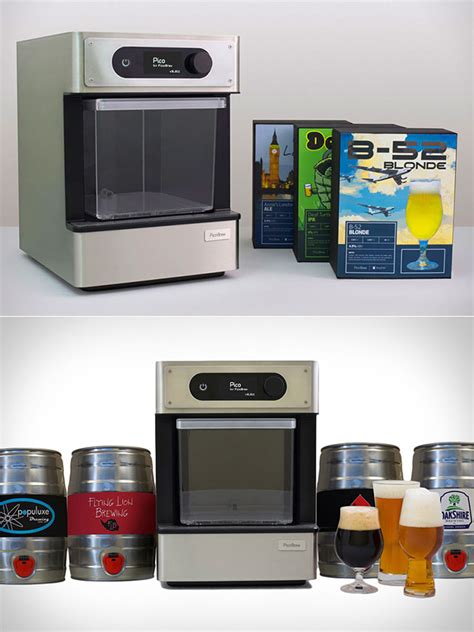The world of beer has undergone a significant transformation over the years, with technology playing a crucial role in shaping the industry. From brewing and packaging to marketing and sales, tech has found its way into every aspect of the beer business. In this article, we will explore five ways in which tech meets beer, and how it's changing the game for brewers, distributors, and consumers alike.
1. Smart Brewing and Automation

Gone are the days of manual brewing and tedious quality control processes. With the advent of smart brewing and automation, breweries can now streamline their operations, reduce waste, and improve consistency. Automated brewing systems, equipped with sensors and IoT devices, can monitor and control temperature, pH levels, and fermentation rates in real-time. This enables brewers to optimize their recipes, reduce errors, and produce high-quality beer more efficiently.
Benefits of Smart Brewing
- Improved consistency and quality
- Reduced waste and energy consumption
- Increased efficiency and productivity
- Enhanced scalability and flexibility
For instance, breweries like Sierra Nevada and New Belgium have already adopted automated brewing systems, which have helped them increase their production capacity while maintaining their commitment to quality.
2. Craft Beer Marketplaces and Online Sales

The rise of e-commerce and online marketplaces has transformed the way people buy and discover craft beer. Platforms like Untappd, Drizly, and BeerMenus allow consumers to browse and purchase beer from local breweries, distributors, and retailers. These platforms also provide valuable data insights on consumer behavior, preferences, and sales trends, helping breweries and distributors to optimize their marketing strategies and improve their online presence.
Benefits of Online Beer Marketplaces
- Increased visibility and reach for breweries and distributors
- Improved customer engagement and loyalty
- Enhanced data insights for marketing and sales strategies
- Convenient and hassle-free shopping experience for consumers
For example, Drizly, an online beer marketplace, has partnered with local breweries and distributors to offer a wide selection of craft beer to consumers. This platform has helped breweries like Dogfish Head and Lagunitas to expand their online presence and reach new customers.
3. Beer Tracking and Inventory Management
Effective inventory management is critical for breweries, distributors, and retailers to ensure that the right beer is delivered to the right customer at the right time. Beer tracking and inventory management systems, powered by RFID, GPS, and IoT technologies, enable businesses to track their beer inventory in real-time, monitor storage conditions, and optimize logistics.
Benefits of Beer Tracking and Inventory Management
- Improved inventory accuracy and reduced waste
- Enhanced supply chain visibility and control
- Increased efficiency and productivity
- Better customer satisfaction and loyalty
For instance, breweries like Founders Brewing Co. and Bell's Brewery have implemented beer tracking and inventory management systems to improve their logistics and customer satisfaction.
4. Beer Quality Control and Testing

Beer quality control and testing are critical aspects of the brewing process, ensuring that the final product meets the desired standards of taste, aroma, and appearance. Advanced technologies like spectrophotometry, chromatography, and microbiological testing enable breweries to analyze their beer's chemical composition, detect impurities, and identify potential quality issues.
Benefits of Beer Quality Control and Testing
- Improved beer quality and consistency
- Reduced risk of contamination and spoilage
- Enhanced customer satisfaction and loyalty
- Increased efficiency and productivity
For example, breweries like Sierra Nevada and Stone Brewing have invested in advanced beer testing equipment to ensure the quality of their beer and maintain their reputation for excellence.
5. Virtual and Augmented Reality Beer Experiences

Virtual and augmented reality technologies are revolutionizing the way people experience and interact with beer. Breweries like Guinness and Heineken have created immersive VR experiences that allow customers to explore their breweries, learn about their brewing processes, and interact with their beers in a unique and engaging way.
Benefits of Virtual and Augmented Reality Beer Experiences
- Enhanced customer engagement and loyalty
- Increased brand awareness and education
- Improved customer experience and satisfaction
- New revenue streams and marketing opportunities
For instance, Guinness has launched a VR experience that allows customers to explore their brewery and learn about their brewing process. This experience has helped Guinness to increase brand awareness and engagement among customers.
Gallery of Beer Technology




What is smart brewing and automation?
+Smart brewing and automation refers to the use of advanced technologies like IoT devices, sensors, and automation systems to streamline and optimize the brewing process.
How does beer tracking and inventory management work?
+Beer tracking and inventory management systems use RFID, GPS, and IoT technologies to track beer inventory in real-time, monitor storage conditions, and optimize logistics.
What is the benefit of virtual and augmented reality beer experiences?
+Virtual and augmented reality beer experiences enhance customer engagement and loyalty, increase brand awareness and education, and provide new revenue streams and marketing opportunities.
As we can see, technology has become an integral part of the beer industry, transforming the way breweries operate, market, and engage with customers. From smart brewing and automation to virtual and augmented reality experiences, tech is revolutionizing the world of beer and creating new opportunities for growth and innovation. Whether you're a brewer, distributor, or beer enthusiast, it's clear that the future of beer is bright, and it's all thanks to the power of technology.
